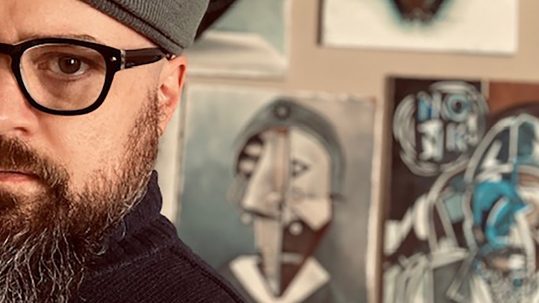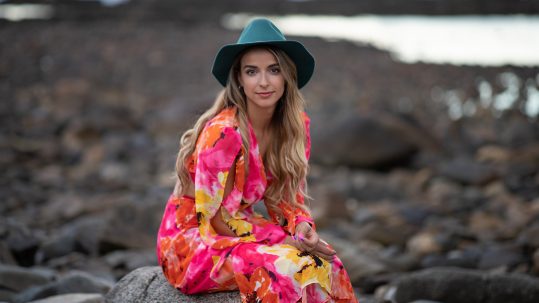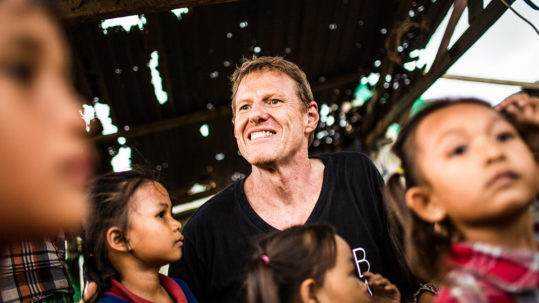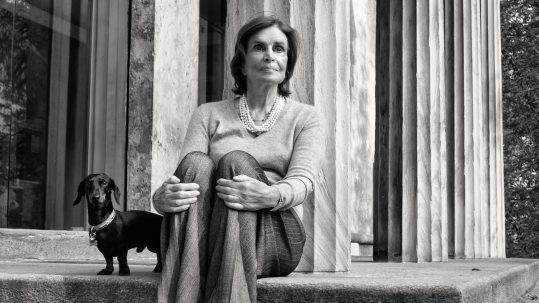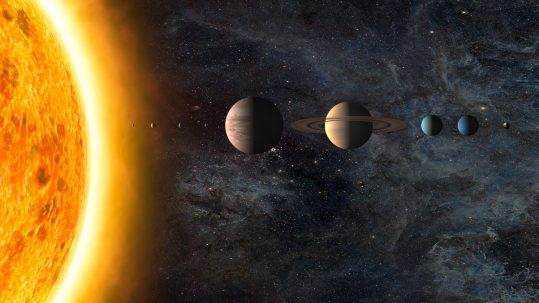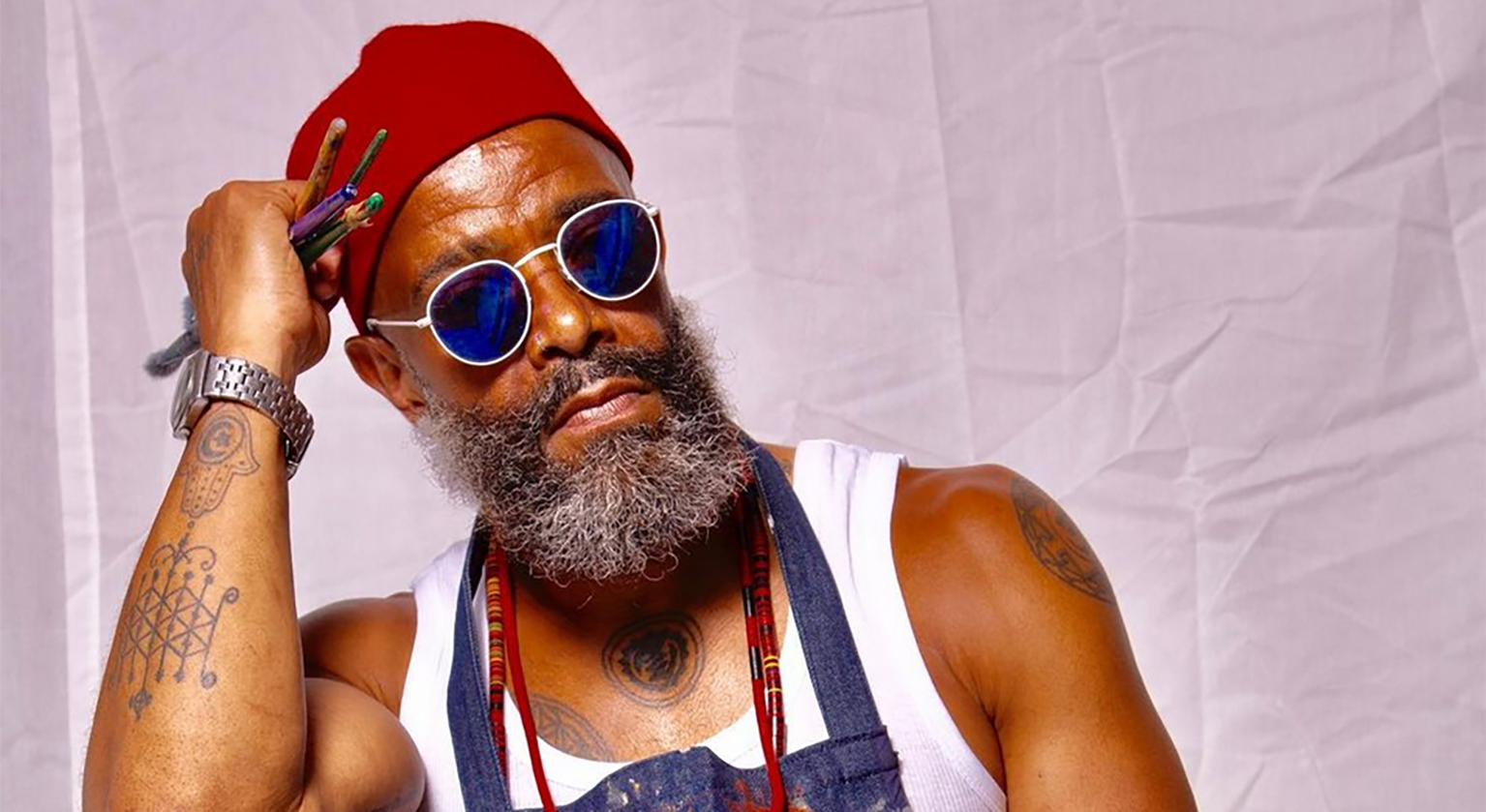
07 Mar Patrick Dougher
Photo by June Padilla @_just.june
PATRICK DOUGHER
Blessed with exceptional talents and a sense of self-awareness that rescued him from years of substance abuse and alcoholism, Patrick Dougher rose to the spotlight two decades ago to become an emblematic creative force. Dougher is a self-taught artist, musician, poet, educator, and spiritual activist. He has played and recorded with Sade, Chuck D (of Public Enemy), and Dan Zanes; he is the drummer on “Dub Side as the Moon,” one of the best-selling reggae LPs of all time. On his spiritual journey, Dougher has also brought healing and comfort to HIV-positive children through his art therapy program at the Kings County Hospital. As a former program director at Groundswell, a community-based youth empowerment organization in East New York, he was responsible for over 300 of the city’s best murals. Through his paintings, mixed-media collages, and sculptures, Dougher aims to celebrate people of African descent and connect urban African American culture to its roots. I had the privilege of speaking to the artist about art, life, love, spirituality, and what it takes to be human.
By Victoria Adelaide | March 08. 2021
Victoria Adelaide: How did you come to art, and was it encouraged in your youth?
Patrick Dougher: I really don’t know. There were no artists in my family. I come from a poor working class family, where art wasn’t the focus; art was considered a luxury and definitely not a career. As a family, we didn’t go to museums or galleries; I never went to art school, and I dropped out of high school. Yet, despite all this, I was always drawn to art and to being creative. I’m from New York, Brooklyn, so there were many opportunities to experience art in my environment.
VA: Surprisingly, you seem uncomfortable when people refer to you as an artist. Why is that?
PD: I’m not too fond of the label “artist” because I find it confining. As I said earlier, I come from a working class family, and I never went to art school. To me, an artist is a person who has gone to art school, has a degree in art and a studio, and makes art full time; this kind of life is different than the life I was living. I always create, and I am always driven by the need to create, but I never felt comfortable with the title “artist” because I don’t feel it fits my journey.
VA: The extent of your talents is incredible; whether it is music, painting, or poetry, you seem to be equally at home in each discipline. I’m curious: How does it work for you? Is it that each discipline somehow lacks something, or is each discipline giving you a certain experience that the other doesn’t, so all together, they make you feel complete?
PD: You’re right: They all give me something, and they all lack something as well. I think that’s why I don’t differentiate between the different creative disciplines. These are all different ingredients – music, visual arts, poetry, writing – in what I would call one common soup of creation. Each thing is filled with certain parts, but at the same time it is itself part of a whole. Whenever I have art shows, I’m very conscious about the music that’s playing to set the mood. It becomes part of the whole experience. The visual needs space for the audio, so there’s poetry and storytelling in the art. They all work together to tell a larger story.
© Paintings / Mixed-Media by Patrick Dougher.
VA: For some of us, there is a difference between spirituality and religion. How did your background impact the spiritual aspect of your art?
PD: You know, I often say religion is to spirituality what fashion is to style. Fashion is when you pick a style and make it a commodity. It’s like putting style in a box. Religion is like putting spirituality into a box. I think my whole life, whether I was aware of it or not, I have been on a spiritual journey. I was always compelled to connect with something larger than me and was always seeking answers to bigger questions. My father was Irish American, and my mom is African American. My father was Irish Catholic, and my mother is a Jehovah’s Witness. So, there were a lot of mixed messages growing up. I would go to the Catholic church one weekend and to the Kingdom Hall of Jehovah’s Witnesses the next, and it was confusing. The Catholic church has all this beautiful iconic art – that sense of holiness when you walk into a church. Jehovah’s Witnesses it’s just the opposite. There is no art; it is very cut and dry. When I was old enough to start searching on my own, I was introduced to Rastafarianism, Islam, the Five-Percent Nation (aka the Nation of Gods and Earths), which was a big movement in New York, and then later, to eastern religions, Buddhism, Taoism, and Hinduism. My whole journey has been a process of realizing that there is an ultimate truth and many paths to reach that truth. So, I don’t judge anyone’s journey; I think they’re all valid and beautiful. The rituals and the symbols are beautiful; I do believe they are sacred. I do incorporate them in my art and display them on my body as tattoos, because I recognize that there is a power in symbols, and there is a power in rituals. Anything that brings me closer to the source, closer to the ultimate truth, I feel is of value. In a small way, we have been blessed to mirror the ultimate creator by being creative people. When I paint on a canvas, the canvas is blank until I put something there. I create something that never existed until I took the time to create it. And that is, in a very, very small way, imitating God.
VA: What was your experience growing up in Brooklyn as a bi-racial person with Irish heritage?
PD: You, I’m sure, can identify with this. I think every bi-racial person, no matter where they were brought up, can identify with certain experiences. The main feeling is of never quite fitting in because we’re not entirely black, we’re not entirely African, we’re not entirely white, we’re not entirely French, or Irish, in my case. So, we’re walking that line between races and cultures. I think I look black, so unless I tell you that I’m half Irish, you don’t really know, or maybe you know because my name is a giveaway. As a youth, I sometimes found it confusing because I wanted to celebrate my white side, my Irish side, and I could very rarely find spaces to do that because to Irish people, I’m black. To my black side, I was white. I was too white; they used to call me white boy. So, I had to create my own identity. It makes you immediately sort of a misfit; you’re an outcast because you don’t fit perfectly in either place. I found my tribe with other outcasts, with people who didn’t fit in for whatever reason, whether because they were also bi-racial or maybe they were gay. They had qualities that made them different. Those people became my tribe.
VA: Right! When you were a child, your father took you to a gay wedding to teach you tolerance. I bet having a dad or parents with such a great spirit must have had a significant impact on you and on your openness as you grew older?
PD: Being bi-racial gives us an open mind about race, and having parents who were progressive also helps. Also, I have to congratulate my parents because they were poor, working class folks. My father never finished high school, and it wasn’t like they were these hip liberals; they were hard-working and young. My mother was 21 when I was born, and she already had kids. Somehow they were cool, smart, and courageous enough to realize that people are people. And I was always told that we celebrate people for their character and not for their race, culture, or sexual orientation.
© Collages by Patrick Dougher.
VA: You are very outspoken about your past struggles with drug addiction and alcoholism. One of my friends who went through the same ordeals told me once that an addict or an alcoholic’s primary focus is to get their next drink or their next fix.
PD: That’s right; when you are addicted, and when you are an active alcoholic, it is the primary purpose of your life – to get the next drink, the next drug, to get high. As we say, it’s like never getting enough of what you don’t want because you know that it’s killing you, and you know that it’s not making you happy, but you can’t stop. And that’s a certain kind of hell; that’s a misery I would wish on no one. I’m glad because I had a second chance at life when so many addicts and alcoholics never get it. When I had that moment, almost 20 years ago now, 19-and-a-half years to be exact – and I’ve been sober ever since – it was great. It was a spiritual experience that expelled the obsession with drinking and drugs. It wasn’t anything that I did in particular; I think I surrendered, I stopped fighting, I gave up. I was given grace. Angels came into my life in the form of former alcoholics who showed me a way to stay sober one day at a time. I’m just truly blessed. My father died from alcoholism, and my uncle as well. They died from drug addiction and alcoholism; none of them made it past 50. So, I have no idea why I received this grace, but I know that I would never want to forsake the gift of surviving because it’s the most precious thing in my life. It’s why we’re having this conversation right now.
VA: You worked as an art therapist at Kings County Hospital with HIV-positive children. Can you tell us more about that?
PD: That was the early 2000s, and I had just gotten sober. I wasn’t qualified for this job as an art therapist; you need a degree for it. But I saw the ad for the position, and I applied. I think it was God’s grace that I was chosen to be this art therapist working with HIV-positive young people. I did it for two years; it was very difficult because so many of those beautiful children died. I would fall in love with them, and they would die. They are the most precious people, beautiful souls, that I’ve ever met because they didn’t do anything that warranted being born with this disease, and yet they’ve had to live with this their whole lives. When you know that your life can end, you have a different view of it. You don’t take any moment for granted; they lived fully in the moment. That job changed my life.
VA: What did you learn from them?
PD: I learned a profound sense of gratitude. When we first started speaking, I said that I’d been given a second chance at life because, for all intents and purposes, I should have died at the age of 40. So what I got from those young people was unconditional love and gratitude, a pure appreciation for life, for every breath, every moment, and for every laugh. When those young people laughed, it was a different kind of laughter than you and I have. It was a deeper joy. That job was 17 years ago, and to this day, when I’m spiritually balanced, I can still touch that place of deep gratitude and presence.
© Sculptures & Art Cans by Patrick Dougher.
VA: We are currently in uncharted territories with the Covid-19 pandemic. How did it affect you?
PD: It’s hard to be retrospective about the pandemic right now as we are still in the midst of it, but I know it changed me as it changed the world. I’m not sure exactly how, but I feel very blessed that my disposition is introverted; I don’t need many interactions to be happy. However, I think the forced isolation is very damaging to many, to our nature as human beings, because we are social animals, we need each other. So, even if we don’t catch Covid, it’s impossible for this event to not affect our health, physically, mentally, emotionally, and spiritually, because it’s unnatural to be locked away. On top of that, there is a layer of fear, the fear of death. And it’s like gravity; it’s constantly taking you away from positivity. So it’s going to take a while for the whole world to recover. Maybe we will learn some valuable lessons from this experience.
VA: On your spiritual journey, which aspect of your life was the hardest part that you had or still have to work on?
PD: Relationships have been very difficult – I mean romantic relationships as I’m still in the process of learning about myself. There’s always love, but growing together as human beings has been a challenging part of my journey. Finding the person who will accept me for the good, the bad, the ugly, and grow with me – this has been tough.
...In a small way, we have been blessed to mirror the ultimate creator by being creative people.``

